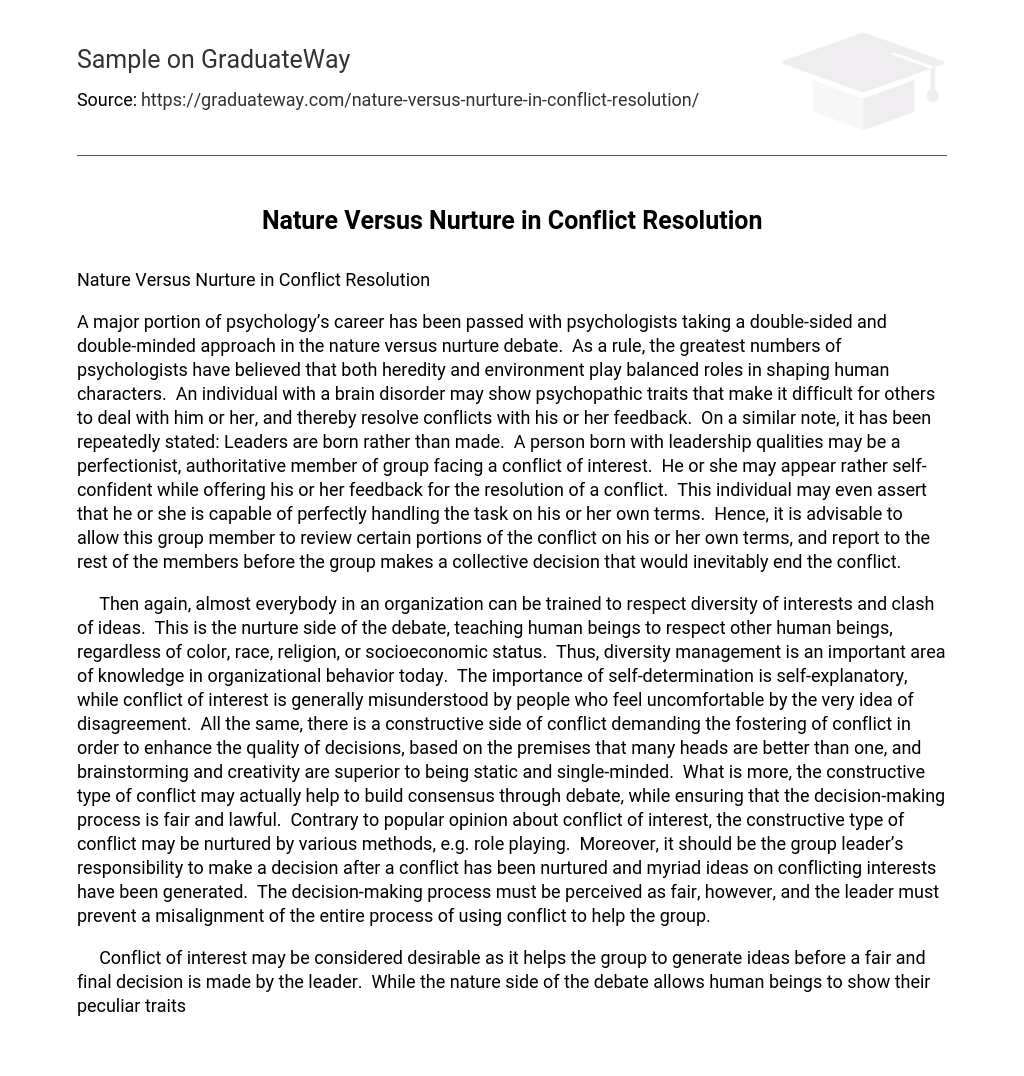A major portion of psychology’s career has been passed with psychologists taking a double-sided and double-minded approach in the nature versus nurture debate. As a rule, the greatest numbers of psychologists have believed that both heredity and environment play balanced roles in shaping human characters. An individual with a brain disorder may show psychopathic traits that make it difficult for others to deal with him or her, and thereby resolve conflicts with his or her feedback. On a similar note, it has been repeatedly stated: Leaders are born rather than made. A person born with leadership qualities may be a perfectionist, authoritative member of group facing a conflict of interest. He or she may appear rather self-confident while offering his or her feedback for the resolution of a conflict. This individual may even assert that he or she is capable of perfectly handling the task on his or her own terms. Hence, it is advisable to allow this group member to review certain portions of the conflict on his or her own terms, and report to the rest of the members before the group makes a collective decision that would inevitably end the conflict.
Then again, almost everybody in an organization can be trained to respect diversity of interests and clash of ideas. This is the nurture side of the debate, teaching human beings to respect other human beings, regardless of color, race, religion, or socioeconomic status. Thus, diversity management is an important area of knowledge in organizational behavior today. The importance of self-determination is self-explanatory, while conflict of interest is generally misunderstood by people who feel uncomfortable by the very idea of disagreement. All the same, there is a constructive side of conflict demanding the fostering of conflict in order to enhance the quality of decisions, based on the premises that many heads are better than one, and brainstorming and creativity are superior to being static and single-minded. What is more, the constructive type of conflict may actually help to build consensus through debate, while ensuring that the decision-making process is fair and lawful. Contrary to popular opinion about conflict of interest, the constructive type of conflict may be nurtured by various methods, e.g. role playing. Moreover, it should be the group leader’s responsibility to make a decision after a conflict has been nurtured and myriad ideas on conflicting interests have been generated. The decision-making process must be perceived as fair, however, and the leader must prevent a misalignment of the entire process of using conflict to help the group.
Conflict of interest may be considered desirable as it helps the group to generate ideas before a fair and final decision is made by the leader. While the nature side of the debate allows human beings to show their peculiar traits through the conflict, the nurture side of the debate permits us to suppose that constructive conflicts may actually help the group by allowing it to gather new ideas for change. Moreover, once the conflict is resolved, group members would be able to agree on the final decision made by the leader, provided that the group is in the habit of nurturing conflicts for positive change. In order to achieve a sense of fairness in its decision-making, the group must seek to avoid all negativity during the conflict. A sense of unity is essential among group members. Lastly, each group member must believe that a conflict of interest must surely lead to an improvement in the work process.
Of course, people will be people. The egomaniac would continue to assume that his or her ideas are best when it is time for idea generation to improve everybody’s lot. At the same time, however, our discussion on constructive conflicts reveals that it is entirely possible to train all group members to behave well toward one another during times of conflict. A complete list of do’s and don’ts may also be published for the entire group to peruse for a conflict to end as a constructive one. The born leader may, of course, continue to show his or her hereditary traits. Those that suffer from brain diseases are most likely to continue showing their peculiar traits as well. As mentioned previously, however, group ethics call for respect to be shown to all members of the group. If the hereditary traits of a group member threaten to turn the conflict into a destructive one, the member may be warned by the group leader. As a matter of fact, the practice of healthy conflict resolution may even bring out the hereditary traits of certain members that others may find virtually impossible to tolerate. In such cases, the group leader has a choice: members that do not respect the views of other members may be forced to leave the group altogether; they may be trained to behave appropriately in future; or they may be given tasks that are most suitable for their peculiar hereditary traits.
Indeed, both nature and nurture should work hand in hand to resolve conflicts. Each human being is an individual with unique fingerprints. At the same time, man is a social animal that must learn the rules of the game.





